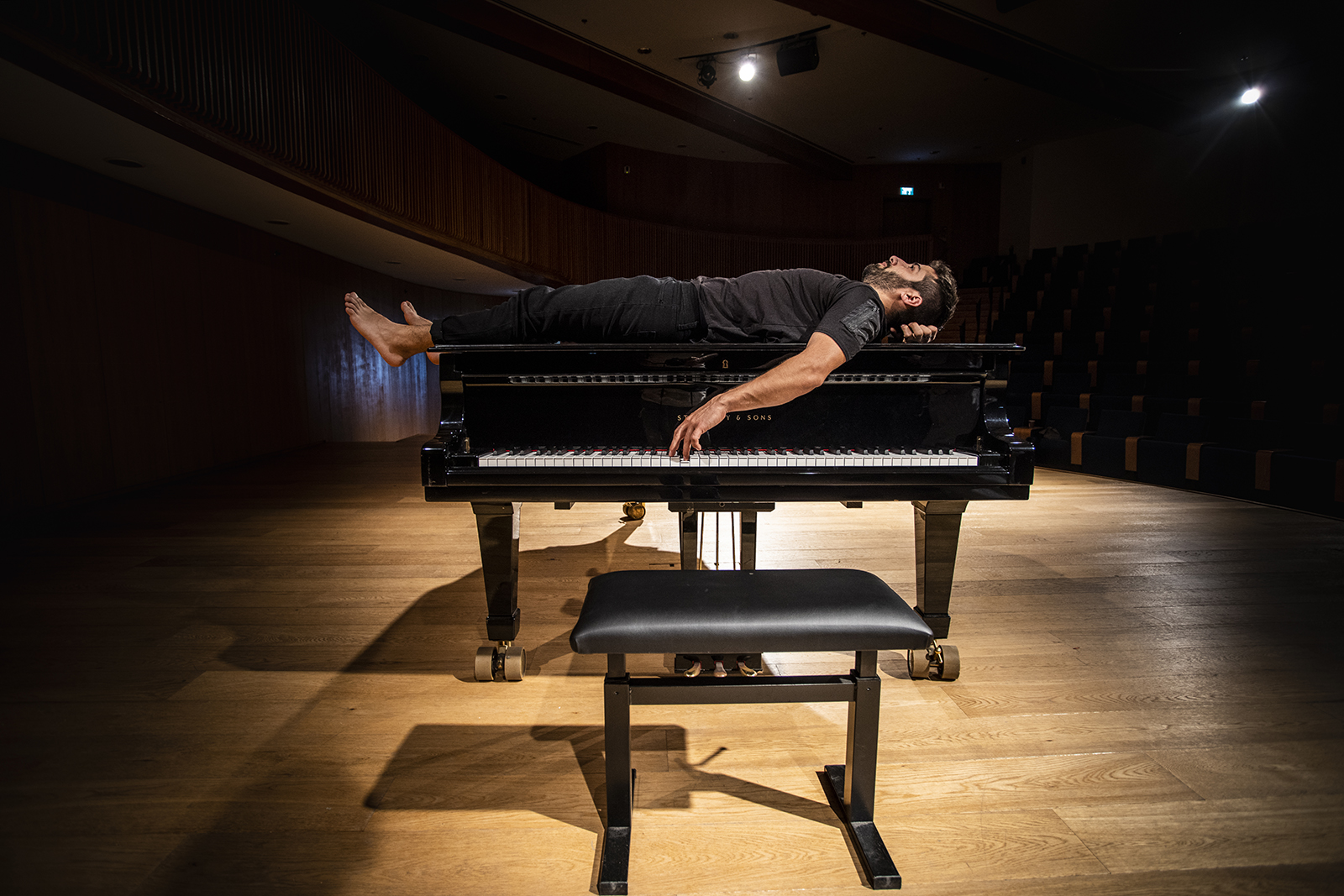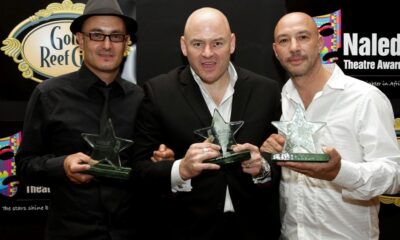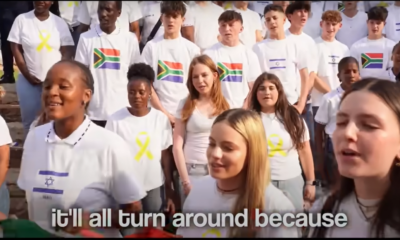
Featured Item

Musical PTSD programme faces silencing from COVID-19
“I’m not supposed to be alive today,” says Dror Zicherman, aged 35. A personal trainer and gym owner, he seems like any other young Israeli.
But almost 15 years ago, he was critically injured when he prevented a suicide bombing with his own body.
He suffers from post-traumatic stress disorder (PTSD), but a music rehabilitation programme called Soul Key has assisted his recovery. After five years of working with PTSD survivors, the programme is facing closure due to COVID-19 budget cuts.
Recalling the moment his life changed forever, Zicherman told the SA Jewish Report, “We received alerts about a terrorist’s intention to bomb a Chanukah event. We built a blockade, and while we were checking cars, a Palestinian taxi arrived with a suicide bomber inside. We removed the passengers and he detonated 30kg of explosives. It instantly killed my commander, and I was critically injured. There was a massive evacuation. Honestly, I’m not sure how I survived. When I arrived at the hospital, I had little to no blood left, my body was completely shattered, I went through clinical death. I was in a coma, and woke up on the eighth day of Chanukah.
“I’ve had about 32 surgeries so far, six months of rehabilitation in hospital, and 18 more months at home. It was excruciatingly painful. I was pretty happy at the time – I was constantly surrounded by people, they called me a hero, and I accepted that role. After six months, I walked out of the hospital and the doctors all clapped.”
Then the tough part began. “I started experiencing flashbacks, anxiety, and panic attacks as well as depression. Suddenly I became an angry person and I wasn’t sure why. Anything would set me off. I kept returning to that awful scene. I was isolating myself as I felt a great deal of shame. I didn’t want anyone to know. It was a huge blow to my ego and the persona of ‘the hero’.”
Exactly three years after the injury, Zicherman had a mental breakdown and was diagnosed with PTSD. “I was shocked. I thought people suffering from PTSD were freaks that were locked in psych wards. Suddenly, I realised that I had all the symptoms. Every day is another small step forward. For seven or eight years, I didn’t function at all. The switch began after Operation Protective Edge. I visited injured soldiers, people who were mentally broken, while everyone was calling them heroes. I decided to deal with my issues head on. I was going to help save people in similar positions to mine.”
The Soul Key programme helped him to rebuild his life. “I used to be anti-institutional, however this programme uplifts, supports, and helps me. It makes me believe in myself, my ability to succeed, the feeling that you are doing something that’s good for you, something that constantly picks you up.”
Yifat Greenwald-Cohen, the founder of Soul Key, is a clinical psychologist who treats PTSD at the Sheba Medical Center. She was injured during Tze’elim Disaster A on 16 July 1990. Five reserve soldiers were killed and 10 injured, including three seriously, when an artillery shell exploded during a training exercise. “I remember lying in hospital. I was listening to music and I started crying. Through the music, I was able to process the mental pain and connect to it,” she says.
“I felt the need to create a rehabilitation and reintegration platform outside of hospitals. We chose the musical path, since music allows us to make the emotional connection when words simply aren’t enough. Music allows participants to let their souls relax, as well as momentarily disconnect from society and gather their mental resources.”
Post-trauma is a breaking point in life, she says, “due to an event or series of events that a person experiences that their soul can’t fully comprehend. The person keeps living their trauma, displaying symptoms which make it difficult for them to be with others. This in turn leads to isolation.”
While the defence department funds PTSD treatment in hospitals, Soul Key fills a gap in that it’s a “normal, non-stigmatised environment”, as opposed to a hospital or clinic. It’s hosted at the prestigious Israeli Conservatory for Music in Tel Aviv, which gives even further impetuous to survivors to attend, feeling pride instead of shame. Soldiers come to the programme with a referral from experts in the field, and it has a waiting list.
The changes in PTSD survivors taking part are dramatic. “Many participants were unable to leave their home for years, unable to deal with themselves as well as society, and couldn’t take on any challenges or responsibilities. We have witnessed some amazing transformations in which people are able to regain control of their lives,” Greenwald-Cohen says.
“Often these successes lead to more successes: they begin enjoying their musical process, suddenly they are able to work, wake up in the morning, use public transport, even go out on dates. We are talking about significant behavioural change. And at home, they have their constant trustee and ‘mental anchor’ – their musical instrument. As one participant once said, ‘Soul Key is like a medicine. If you take it away, the participants will experience regression and prejudice.’”
The programme costs $3 000 (R45 562) a year per participant, and donations are sorely needed. But even if one can’t contribute financially, there are other ways to help. “Now more than ever, it’s important to raise awareness, to shatter prejudice, and look around, perhaps even find another person with a similar condition that needs your help,” says Greenwald-Cohen. Her dream is to open similar programmes around the world.
Another participant in the programme is Avihai Hollender, aged 28, who was injured in Operation Protective Edge. His new song, Why father can’t find peace, has just been released and is a haunting and heartbreaking look at the effects of PTSD on children and families. It can be found on YouTube. Yoav De Paz is 40 years old and learning to play the flute. Throughout his service as a combat soldier, he was exposed to harsh scenes around Gaza and Ramallah, where his friend’s throat was slit, and he was diagnosed with PTSD.
Eyal Atzmon is 34 years old and learning to play the saxophone. He was injured in the second Lebanon War, and after his friend died in front of him, he was diagnosed with PTSD. Ofra Yitzhaki is 55 years old and a former military police officer. She was recently hospitalised in a mental institute during the day, and is learning to play the drums.
For Zicherman, who works as a mentor and lecturer and is soon to release a book, “Everything I do is still connected to PTSD, though not in a sense of surrendering. I’m writing a song about Ori, my commander who was killed. It’s a song about my experiences with him, not necessarily his memory. I admit that I’m not in touch with Ori’s family, and I’d rather stay away from that because it brings up a lot of demons within me … about the fact that those who die get treated with respect, which they truly deserve. However, no one thinks about those suffering from PTSD, those who were left behind and continue to carry the burden. In the song, I’m able to combine both these worlds – that of the trauma, and that of the mourning. I want to continue to spread that message – we are alive and we deserve to be, and more so, that we have nothing to be sorry for.”
To learn more and donate, visit https://savesoul.icm.org.il/










